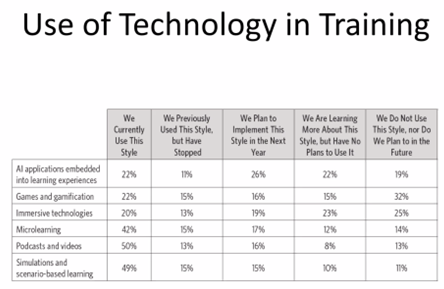ATD Blog
Be a Late Adapter
Fri Jan 19 2024

Content
With the new year upon us—and all its emails highlighting trends and anticipated innovations in the months to come—I’m skeptical. Because over the past few decades in our field, I’ve found that buzz about potential advancements is fast, but organizations are slow.
With the new year upon us—and all its emails highlighting trends and anticipated innovations in the months to come—I’m skeptical. Because over the past few decades in our field, I’ve found that buzz about potential advancements is fast, but organizations are slow.
Content
Perhaps you’re reacting to your overflowing new year messages with worry. And maybe you feel that you’re behind the times because you’re not fluent in artificial intelligence (AI) yet or fully on board with badges and credentialing. Fear not. I’ve been consulting for private and public organizations for more than 25 years, and few are at the leading edge of innovation.
Perhaps you’re reacting to your overflowing new year messages with worry. And maybe you feel that you’re behind the times because you’re not fluent in artificial intelligence (AI) yet or fully on board with badges and credentialing. Fear not. I’ve been consulting for private and public organizations for more than 25 years, and few are at the leading edge of innovation.
Content
Consider this: Decades into using learning management systems (LMSs), I hear many organizations lamenting their platforms. For example, few host customized e-learning that adapt to a learner’s custom needs, and many can’t get their LMS to communicate with other organizational systems. Some have not even configured their systems to reflect which manager matches which learner. How can the learning function conduct level 3 evaluation if they can’t follow up with the person to whom your learners report?
Consider this: Decades into using learning management systems (LMSs), I hear many organizations lamenting their platforms. For example, few host customized e-learning that adapt to a learner’s custom needs, and many can’t get their LMS to communicate with other organizational systems. Some have not even configured their systems to reflect which manager matches which learner. How can the learning function conduct level 3 evaluation if they can’t follow up with the person to whom your learners report?
Content
Or what about gamification? We’ve been talking about gamification for decades, but only a few organizations I work with are dipping their toes into this pool. And a lack of gamification hasn’t necessarily set their companies back. If L&D teams are designing training that is relevant and helps people do their jobs better, solve problems they face in their day-to-day, and feel more confident with their skill set, why would a gamification approach be any more motivating? Perhaps that’s why it hasn’t blazed onto the scene. Look at how gamification shows up in ATD’s most recent State of the Industry report : only 22 percent are using it; 15 percent were using it and have stopped, and 32 percent are not using it and have no plans to do so.
Or what about gamification? We’ve been talking about gamification for decades, but only a few organizations I work with are dipping their toes into this pool. And a lack of gamification hasn’t necessarily set their companies back. If L&D teams are designing training that is relevant and helps people do their jobs better, solve problems they face in their day-to-day, and feel more confident with their skill set, why would a gamification approach be any more motivating? Perhaps that’s why it hasn’t blazed onto the scene. Look at how gamification shows up in ATD’s most recent State of the Industry report: only 22 percent are using it; 15 percent were using it and have stopped, and 32 percent are not using it and have no plans to do so.
Content
Sound familiar? Absolutely. Sound cutting edge? Not so much.
Sound familiar? Absolutely. Sound cutting edge? Not so much.
Content
Indeed, the numbers on the chart below (also from ATD’s State of the Industry report) reveal that less than half of the organizations surveyed are adopting “new” technology and methods for learning.
Indeed, the numbers on the chart below (also from ATD’s State of the Industry report) reveal that less than half of the organizations surveyed are adopting “new” technology and methods for learning.

Content
I recently had the opportunity to speak on a panel at ATD-NYC’s micro-conference, Navigating the Future of Talent Development. When I was asked to share how I’d advise someone wanting to embrace emerging trends in L&D, I found myself suggesting they embrace the idea of being a “late adapter.” Too often, we spend time and energy jumping on a bandwagon only to discover that the idea, which didn’t come from the world of learning and development (such as virtual reality, learner personas, or Net Promoter Scores), simply don’t replace the fundamentals of good design for adult learners.
I recently had the opportunity to speak on a panel at ATD-NYC’s micro-conference, Navigating the Future of Talent Development. When I was asked to share how I’d advise someone wanting to embrace emerging trends in L&D, I found myself suggesting they embrace the idea of being a “late adapter.” Too often, we spend time and energy jumping on a bandwagon only to discover that the idea, which didn’t come from the world of learning and development (such as virtual reality, learner personas, or Net Promoter Scores), simply don’t replace the fundamentals of good design for adult learners.
Content
Here are some other thoughts on how to adapt to the latest trends:
Here are some other thoughts on how to adapt to the latest trends:
Content
Know the difference between fad and trend. To see if a fad will turn into a trend, look at the problem it was intended to solve and the evidence that it has done so. Can talent development use fidget spinners or Pokémon Go? No. What about Agile? Some. ADDIE? Absolutely.
Know the difference between fad and trend. To see if a fad will turn into a trend, look at the problem it was intended to solve and the evidence that it has done so. Can talent development use fidget spinners or Pokémon Go? No. What about Agile? Some. ADDIE? Absolutely.
Content
Don’t get bowled over by tools that are not built for learning. Instead, really dig into the potential ways to use them—before totally buying in. For example, are there ways AI can help with ISD? Sure, I’ve found uses at all levels—consolidating qualitative needs assessment data into themes (that do need to be double checked), writing course descriptions, even coming up with a very basic workshop outline. But I’m not bowled over.
Don’t get bowled over by tools that are not built for learning. Instead, really dig into the potential ways to use them—before totally buying in. For example, are there ways AI can help with ISD? Sure, I’ve found uses at all levels—consolidating qualitative needs assessment data into themes (that do need to be double checked), writing course descriptions, even coming up with a very basic workshop outline. But I’m not bowled over.
Content
Bottom line: Trends are of the moment, but don’t let them trip you up. The fundamentals of how adults learn, how people process and retain information, and what qualities make a program stick are here to stay. Remember: it’s not instead of, it’s in addition to. And don’t be afraid to be a late adapter.
Bottom line: Trends are of the moment, but don’t let them trip you up. The fundamentals of how adults learn, how people process and retain information, and what qualities make a program stick are here to stay. Remember: it’s not instead of, it’s in addition to. And don’t be afraid to be a late adapter.
